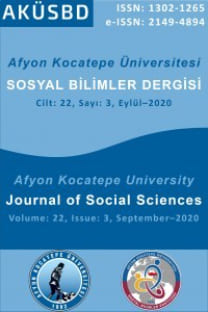Yolsuzluğun sosyo-ekonomik analizi: Ege bölgesi anket çalışması
dayanarak tespit etmenin mümkün olmaması nedeniyle, ülkelerin yolsuzluk düzeyleri algı ölçümleri ile belirlenmektedir. Bu çalışma, teorik bilgiler eşliğinde, yolsuzluk algısını ve bu algıya etki eden temel faktörleri belirlemek amacıyla vergi mükellefleri üzerinde Ege Bölgesi’nde gerçekleştirilen bir anket çalışmasından elde edilen verilerin analizinden oluşmaktadır. Yapılan analizlerde, örnek kitlenin yolsuzluk algısı bir hayli yüksek bulunmuştur. Bu algıya etki eden faktörler içinde kamusal harcamalar, vergi yükü, kurumsal kalite, demokrasi düzeyi, vergi ahlakı, siyasal iktidarın algılanma şekli, şeffaflık ve yürürlükteki cezalar en belirgin olanlarıdır.
Socio-economic analysis of corruption: A survey in aegean region
Corruption, accepted as a serious problem especially for developing countries, is defined as abusing public force and public sources for gaining private benefit. Since it is impossible to confirm the level of corruption on the basis of official data, countries’ corruption levels are determined by measuring the perception of corruption. This paper consists of a survey on taxpayers which is conducted in Aegean Region and empirical analysis of this data which is implemented for determining the perception of corruption level and basic determinants of this perception, accompanied by theoretical framework. According to the results of analysis, the perception of corruption level of sampling unit is very high. The most evident factors which affect this perception are public expenditures, tax burden, institutional quality, level of democracy, tax morale and perception of political government, transparency and current legal penalties.
___
- AKÇAY, Selçuk. (2001), Gelişmekte Olan Ülkelerde Yolsuzlukların Ekonomik Analizi, Afyon Kocatepe Üniversitesi Sosyal Bilimler Enstitüsü, Yayınlanmamış Doktora Tezi, Afyon.
- ALTUĞ, E. Figen, ÇAK, Murat, ŞEKER, Murat ve BİNGÖL, Önder. (2009), Yerel Yönetimlerde Hizmetlerden Memnuniyet ve Yolsuzluklar, İstanbul Araştırması, İstanbul: İSMMMO Yayını, No.121.
- ASIEDU, Elizabeth. (2004), “Policy Reform and Foreign Direct Investment to Africa: Absolute Progress but Relative Decline”, Development Policy Review, 22(1), 41-48.
- BAŞAR, Selim. (2004), “Yolsuzlukların Doğrudan Yabancı Yatırımlar Üzerindeki Etkileri”, İktisat-İşletme ve Finans, 19 (222), 66-76.
- BERKMAN, Ümit. (1983), Az Gelişmiş Ülkelerde Kamu Yönetiminde Yolsuzluk ve Rüşvet, Ankara: TODAİE Yayını.
- BRAITHWAİTE, Valerie and AHMED, Eliza. (2005), “A Threat to Tax Morale: The Case of Australian Higher Education Policy”, Journal of Economic Psychology, 26, 523–540.
- ÇELEN, Mustafa. (2007), Yolsuzluk Ekonomisi: Kamusal Bir Kötülük Olarak Yolsuzluğun Ekonomik Analizi. İstanbul: İSMMMO Yayını, No. 77.
- DEL MONTE, Alfredo and PAPAGNI, Erasmo. (2001), “Public Expenditure, Corruption and Economic Growth: The Case of Italy”, European Journal of Political Economy, 17, 1-16.
- DEMİRTAŞ, Gökhan ve AKÇAY, Selçuk. (2006), “Kurumsal Faktörlerin Doğrudan Yabancı Yatırımlar Üzerine Etkisi: Ampirik Bir Kanıt”, Gazi Üniversitesi, İİBF Dergisi, 8 (2), 15-33.
- DIAMOND, Larry and PLATTNER, M. F. (1993), The Global Resurgence of Democracy, Baltimore: Johns Hopkins University Pres.
- DUBIN, Jeffrey A., GRAETZ, Michael J. and WILDE, Louis L. (1990), “The Effect of Audit Rates on the Federal Individual Income Tax: 1977-1986”, National Tax Journal, 43 (4), 395-409.
- GELİR İDARESİ BAŞKANLIĞI (2008), İstatistikler. http://www.gib.gov.tr/fileadmin/user_upload/ VI/AIGMS/2008/TABLO_2.xls.htm (Erişim: 21/01/2010).
- HILLMAN, Arye L. (2004), “Corruption and Public Finance: An IMF Perspective”, European Journal of Polical Economy, 20, 1067-1077.
- JOHNSTON, Michael. (1998), “Fighting Systemic Corruption: Social Foundations for Institutional Reform”, M. Robinson (Ed.), Corruption and Development, London: Frank Cass Publisher.
- KAUFMANN, Daniel, KRAAY, Aart and MASTRUZZI, Massimo. (2007), “Governance Matters VI: Aggregate and Individual Governance Indicators, 1996-2006”, Washington DC: Policy Research Working Paper Series, No. 4280, World Bank.
- KUGLER, Maurice, VERDIER, Thierry and ZENOU, Yves. (2005), “Organized Crime, Corruption and Punishment” Journal of Public Economics, 89, 1639-1663.
- LARRAIN, Felipe and TAVARES, Jose. (2004), “Does Foreign Direct Investment Decrease Corruption?”, Cuadernos De Economia, 41 (August), 217-230.
- LAVALLEE, Mark E. (2008), “Corruption and Institutional Trust in Sub- Saharan Africa”, Transparency International, Global Corruption Report, Cambridge: Cambridge University Press, 344-346.
- MAURO, Paolo. (1995), “Corruption and Growth”, Quarterly Journal of Economics, 110 (3), 681-712.
- MAURO, Paolo. (1998), “Corruption: Causes, Consequences and Agenda for Further Research”, Finance & Development, March 1998, 11-14.
- MORGAN, Amanda L. (1998), “Corruption: Causes, Consequences and Policy Implications: A Literature Review”, Working Paper, No.9, San Francisco: The Asia Foundation.
- ÖZSEMERCİ, Kemal. (2003), Türk Kamu Yönetiminde Yolsuzluklar, Nedenleri, Zararları ve Çözüm Önerileri, Sayıştay Araştırma, İnceleme, Çeviri Dizisi, No. 27, Ankara.
- PALDAM, Martin. (2002), “The Cross-Country Pattern of Corruption: Economics, Culture and The Seesaw Dynamics”, Eoropean Journal of Politican Economy, 18, 215-240.
- PINTO, Ambrose. (1992), “Institutionalised Corruption”, Economic and Political Weekly, 27 (35) (August 1992), 1837-1838.
- POLINSKY, A. Mitchell and SHAVELL, Steven. (2001), “Corruption and Optimal Law Enforcement”, Journal of Public Economics, 81, 1-24.
- SAUNDERS, Mark, LEWIS, Philip and THORNHILL, Adrian. (2000), Research Methods for Business Students. Second Edition, Essex: Prentice Hall.
- SAYAN, İpek Ö. ve KIŞLALI, Murat. (2004), “Yolsuzluk Üzerine Ekonometrik Bir Çalışma”, Ankara: AÜ GETA Tartışma Metinleri, No. 73, (Haziran-2004).
- ŞEKER, Murat. (2008). “Kamu Ekonomisi Açısından Rüşvet”, İÜ İktisat Fakültesi Maliye Araştırma Merkezi Konferansları, 50. Seri, 87-104.
- TANZI, Vito and DAVOODI, H. R. (2000), “Corruption, Growth and Public Finances”, IMF Working Paper, No. 97/139, Washington DC.
- TORGLER, Benno. (2004), “Tax Morale, Trust and Corruption: Empirical Evidence from Transition Countries”, CREMA Working Paper, No: 2004/5, Basel.
- TORGLER, Benno, DEMIR, İhsan. C., MACINTYRE, Allison and SCHAFFNER, Marcus. (2008). “Causes and Consequences of Tax Morale: An Emprical Investigation”, Economic Analysis and Policy, 38 (2), 313-342.
- TRIESMAN, Daniel. (2000), “The Causes of Corruption: A Cross-National Study”, Journal of Public Economics, 76, 399-457.
- WORLD BANK (1997), Helping Countries Control Corruption: The Role of the World Bank, Washington DC.
- ISSN: 1302-1265
- Yayın Aralığı: Yılda 4 Sayı
- Başlangıç: 1999
- Yayıncı: Afyon Kocatepe Üniversitesi Sosyal Bilimler Enstitüsü
Sayıdaki Diğer Makaleler
Hatay meselesinin çözümü esnasında Başbakan Celâl Bayar’ın faaliyetleri
Afyonkarahisar ilinin turizm gelişimi ve çekicilikleri
Mehmet Ali ÖZDEMİR, İsmail KERVANKIRAN
Yolsuzluğun sosyo-ekonomik analizi: Ege bölgesi anket çalışması
Hasan Hüseyin CEYLAN, Serdar AYDIN
Neo-patrimonyalizm yaklaşımına karşı yapılaşma olarak Türk modernleşmesi
2008 Küresel krizinin yayılma süreci ve etkileri: Seçilmiş ülkeler için ekonometrik bir analiz
